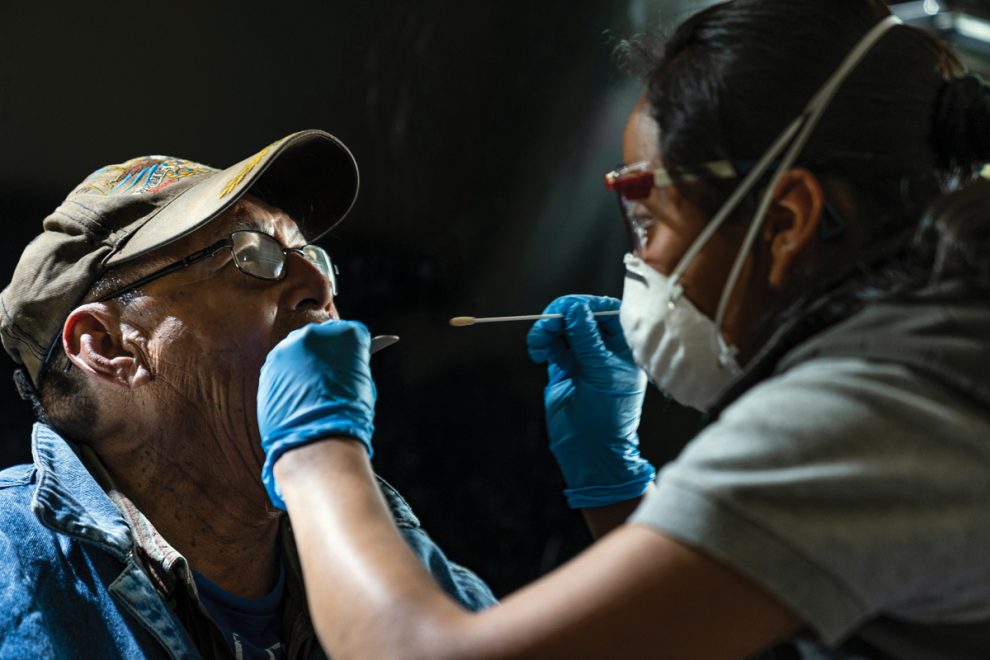Wealthy countries around the world are digging deep to mitigate the worst impacts of the COVID-19 pandemic: disbursing grants to businesses and corporations, expanding unemployment benefits, and creating emergency sick leave policies on the fly for workers traditionally bereft of such social assistance.
The idea is to prevent a temporary crisis from causing permanent harm to people and economies. Some nations have proved more creative and generous than others. The Trump administration disgorged trillions to keep the U.S. economy out of a COVID-19 mire but somehow still cannot bring itself to deliver consistent aid directly to struggling families and furloughed workers.
As many Western states hunker down in nationalistic bunkers to ride out the pandemic, they threaten to ignore or downplay the novel coronavirus’ impact on the developing world—a reflexive posture that could have catastrophic long-term consequences. The United Nations warns that the progress of the past few decades is on the verge of reversing itself because of COVID-19.
The global economy has had its share of hard knocks in recent years, but it has still managed to maintain an uptrend in meeting antipoverty and hunger-alleviation goals. But 2020 could be different. As one U.N. Development Programme analyst put it, the pandemic represents a triple shock to developing nations, simultaneously assailing health, education, and income.
Just weeks before the novel coronavirus was finally declared a pandemic, officials at the International Monetary Fund were predicting positive per capita income growth in more than 160 countries in 2020. By mid-April that assessment had been turned on its head. The International Monetary Fund now predicts more than 170 countries will experience per capita income losses this year.
In the deeply interwoven political and economic reality of the modern world, no person is a stranger––everyone is your neighbor.
Improving education among the world’s poorest communities has been a long-term antipoverty ambition. But over the next few years, as educators grapple with how to teach under a coronavirus cloud, the world’s most vulnerable children and their families will likely face the hardest struggle. According to U.N. Development Programme estimates, 60 percent of the world’s children will be cut off from effective schooling in 2020, leading to education deficits not seen since the 1980s.
COVID-19 is also causing vast personal and economic dislocation among the world’s poorest agriculturalists, who would normally have been preparing for growing seasons just as national lockdowns began. Now many worry that the 2020 harvest will be so diminished that the number of people at risk of starvation will double to as many as 265 million people.
A medical missionary in Liberia told me that COVID-19 represents an unprecedented threat in Africa, pointing out that unlike past viral outbreaks such as Ebola, which were limited to a handful of states, the novel coronavirus has become a threat to all people around the world at the same time.
She worries that Liberia and other African states will be left to confront the epidemic on their own, bereft of the help they could normally expect from Europe and the United States. She also worries that hard-earned progress against “normal” miseries such as malaria and dengue fever may be lost as resources dry up or are diverted to confront COVID-19.
The novel coronavirus does not care about our politics.
During crises it is natural to look first to the assistance of your nearest and dearest: family members, neighbors, and fellow citizens. But in the deeply interwoven political and economic reality of the modern world, no person is a stranger—everyone is your neighbor.
The novel coronavirus does not care about our politics or clashing assessments of justice. It will continue its opportunistic strikes until an effective global strategy to suppress it is put in effect. As officials from Catholic Relief Services recently reminded Congress: If we don’t beat COVID-19 everywhere, we can’t beat it anywhere.
This article also appears in the September issue of U.S. Catholic (Vol. 85, No. 9, page 42). Click here to subscribe to the magazine.
Image: Flickr.com/CDC Global














Add comment